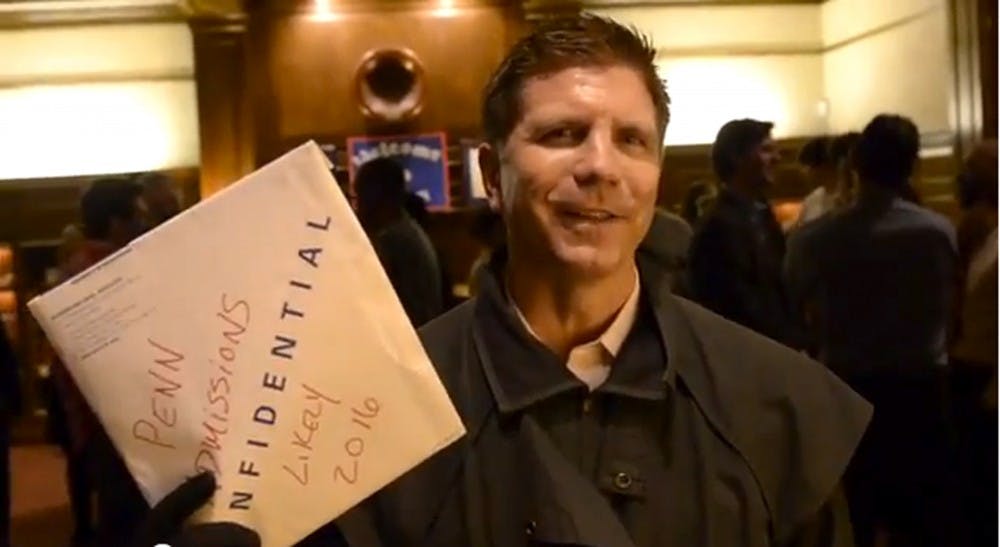Regular decision applicant Caroline McCue — a senior at Sherwood High School in Sandy Spring, Md. — had put Penn out of her mind temporarily until the end of March.
It came to her as a surprise, then, when she received an email on Friday that led her to a website containing a video and a “likely letter” welcoming her to Penn.
This weekend, the Office of Admissions sent out about 230 nonathletic likely letters, according to Dean of Admissions Eric Furda.
Every year, Penn sends academic likely letters to students the University believes will be competitive in the applicant pools of peer institutions.
In particular, the Office of Admissions focused its likely campaign this year on students who expressed an interest in science, technology, engineering and mathematics, as well as those with an interest in the arts.
“We’re going after some of the top academic students, and within that, we’re making it more refined going after some subject areas and some geographic areas,” Furda said.
For her part, McCue had not known about the existence of these “likely letters” before she checked her inbox on Friday.
While McCue’s initial enthusiasm for Penn had slowly dwindled after visiting campus last year because of acceptance letters from other schools, Friday’s news changed the game.
Also on theDP.com
Penn applicants seek help from advisers
Admissions to target first-generation students
Students connect with admitted applicants
Related
“Penn wasn’t on the top of my radar, but I got the likely letter and now it’s shot right up to the top,” she said. “I’m really excited for Penn now.”
Last year, the Office of Admissions became one of the first colleges in the country to make use of a video to inform likely recipients, in place of a physical letter.
This year, Penn expanded its likely efforts even further.
Helped by the student-run Admissions Dean’s Advisory Board, the University created several different videos — targeted at students, families and high-school counselors — as part of this year’s campaign.
The admissions office has also been working with ADAB to begin a pilot program that pairs likely letter recipients with student leaders on Penn’s campus.
“Based on the feedback we got from the likely students last year, we really addressed the questions ‘why likely, why Penn, why me?’ through the video, hopefully in a high-energy way,” Furda said.
Jeffrey Durso-Finley — director of college counseling at The Lawrenceville School in Lawrenceville, N.J. — said the online explanation of likely letters that Penn provided to students to this year was “incredibly helpful.”
Many students, like McCue, may not know what a likely letter is, and thus may not know what to think upon receiving one, he said.
“Historically, it’s been a problem when they get a letter before the official date and they get confused,” he said. “Having the information coming directly from the admissions office will provide that confidence and that assurance that the letter is what it says it is.”
Michael Goran — a 1976 College graduate and founder of IvySelect College Consulting — said Penn’s unique approach to likely letters may have a positive effect on students’ decisions.
“Any time you can do something to personalize the experience to say ‘we really want you,’ it’s obviously very flattering and it engenders good feelings,” he said.
However, Furda acknowledged that yield rates — the percentage of admitted students who decide to matriculate — are the most obvious and quantifiable measure of the likely letter campaign’s success.
While the overall yield for the Class of 2015 was 63 percent, the matriculation rate among likely letter recipients was significantly lower, coming in at around 30 percent.
Furda said this gap is to be expected.
“You’re going after a cohort of students who are going to have options,” he said. “Hopefully this does produce some tangible results. At the end of it, that’s what we’re going for.”
Regular decision applicant Colton Welch — a senior at West Lincoln High School in Brookhaven, Miss. — said receiving a likely letter this weekend has made him more interested in Penn.
“I thought [the likely letter campaign] was better than other schools — it definitely makes you look into the school a lot more,” he said.
College sophomore and ADAB member Joseph Egozi hopes the increased contact between current undergraduate students likely letter recipients will also influence the students’ decisions.
“It wasn’t a scientific formula on what made you come here — it’s certain connections you make or certain gut feelings you have of the campus,” he said.
Also on theDP.com
Penn applicants seek help from advisers
Admissions to target first-generation students
Students connect with admitted applicants
Related
Penn Admissions: Likely Letter Video



